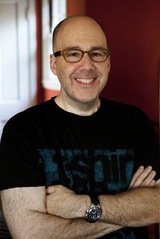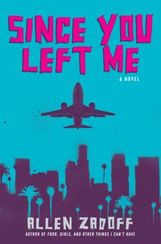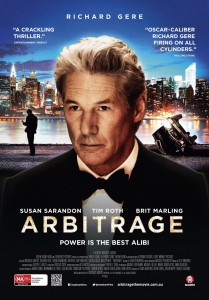Interview: Allen Zadoff of Since You Left Me
Posted on October 26, 2012 at 9:38 pm
 I last talked to Allen Zadoff about his book, My Life, the Theater, and Other Tragedies
I last talked to Allen Zadoff about his book, My Life, the Theater, and Other Tragedies. He was kind enough to give me another interview about his new book, Since You Left Me
. Once again his hero is an unhappy teenage boy who feels isolated (and who shares his author’s initials).
Your main character’s internal and external struggle is exemplified by his name: Sanskrit Aaron Zukerman. How do his feelings about his name tell us about him?
Poor Sanskrit. The battle lines of his life were decided at birth. His Jewish mother is a yoga practitioner and named him after her favorite thing, Sanskrit, the ancient Indian language used in yoga practice. Now in his teens, Sanskrit attends a religious school in Los Angeles because his grandfather left money in a trust for him to get a Jewish education. So Sanskrit is caught in the intersection of family tradition and contemporary life. The teachers at his Jewish school call him by his middle name “Aaron” because it’s familiar to them. Outside of school people call him “Sanskrit”. In a real sense, my hero doesn’t know who he is—Sanskrit or Aaron—and it’s the journey of this novel for him to find out.
Why did you decide to tell the story in the first person? What can you do in that voice that you cannot do any other way?
The first person narrator brings you directly into a character’s thinking process, and with my characters, that’s usually a funny and embarrassing ride. At one point in Since You Left Me, Sanskrit is hiding behind an expensive gift basket while his parents fight, and he has a realization and says, “My family is less painful when viewed through cellophane and foreign chocolate.” That’s the kind of experience you only get in first person.
Also because Sanskrit is on a spiritual journey of sorts, the first person allows me to reveal the twists and turns of his thinking in an immediate and exciting way. We are on the journey with him, understanding what he understands, and experiencing his revelations in real time.
Sanskrit has experienced a lot of loss and disappointment. How has that affected his view of the world?
He’s jaded at sixteen and wondering if God exists. It’s a classic situation—Life doesn’t go your way, and you start to wonder if there’s anyone or anything in charge. As things get more out of control in his life, Sanskrit does what many of us do, he tries harder to make it work out the way he thinks it should be. For example, his mother is threatening to leave the family because she believes she’s found her true love (in India of all places), and Sanskrit’s determined to find a way to make her stay. It’s a dilemma I understand from my own life. When should I apply my will and effort to change a situation, and when should I relax, let go, and accept things as they are? It’s not always easy to know.
What made you decide to write a story set in a religious school? What are some of the most significant struggles teenagers have with spirituality?
I don’t know what struggle teens have, only the struggles I had as a teen. My novel Food, Girls, and Other Things I Can’t Have was based on my experience being overweight in high school. And Since You Left Me
is based on some of my spiritual struggles in high school and also as an adult. When I was young, I went to Hebrew School once a week on Saturdays and I was bar mitzvahed, but I had no real relationship to something greater than myself. Frankly I didn’t think I needed it. I thought being smart, talented, and hardworking would get me where I wanted to go in life. I didn’t think I needed help from God, and I didn’t understand the idea that we might ask God what he wanted from our lives, rather than deciding for ourselves what we want or what might feel good. It’s what Rick Warren calls The Purpose Driven Life
. As with many people, my own spiritual journey grew out of hardship. In my case it was an eating disorder that nearly took me out. At 28 years old I was in serious trouble, and I had to find a new way to live in the world. I tell the story in some detail in my memoir Hungry: Lessons Learned on the Journey from Fat to Thin
.
Your characters often have to deal with parents who behave more like children than their kids. As a writer, what possibilities and themes does that present to you?
It’s true that kids in my novels are often struggling with absent or neglectful parents. Sadly, I have some experience with that—parents who were doing the best they knew how, but who weren’t always there for my brother and I. Often in a novel I’ll take a kernel of my own experience and magnify it for dramatic effect. I also feel it’s an author’s job to understand and have compassion for every character. In Since You Left Me, Sanskrit’s mother is incredibly selfish, a fact that has inspired many readers to write me letters and tell me about their own kooky parents. But as the author, I really understand why this mother does what she does. She tells her children, “How can I love you if I don’t have love in my own life?” It’s twisted logic, but it makes sense in a way. I can imagine a character neglecting her own children while chasing love, thinking all the while she’s doing something positive for her family.
As for the theme, you might say that Since You Left Me is about the moment when we realize our parents are just people, and they are fallible. How do we deal with that realization and what it means for our lives?
Why does Sanskrit have such a hard time trusting or being honest with the people around him?
I think he’s been hurt. By his parents’ divorce. By his mother’s self-involvement. By the feeling that he’s different from the kids in his school, in particular his best friend Herschel who seems to live a faith-based life very easily, while it’s an enormous struggle for Sanskrit. He’s also hurt because the love of his life in second grade seems to have forgotten that he exists. When you get hurt, it becomes hard to trust people and believe that things will work out for the best. This is where faith comes in for many people. Without faith, it’s just you battling your past experiences that have conditioned you to deal with the world in a certain way. But with faith, I think healing is possible. Faith and therapy. I’m a big believer in both things.
What inspires you?
I’m very inspired by music. I listen to music when I write, probably 4-6 hours of it a day. I have mixes on Pandora, Spotify, Songza. I listen to everything from indie rock, to punk, to international hip hop, to jazz, to religious music. I’m all over the map. I have enormous respect for musicians and the joy their work has brought me.
What makes you laugh?
Girls on HBO. Not being a girl in my 20s, I thought I would hate it. To the contrary, I think Lena Dunham is brilliant, and I love her voice, the frankness and humor with which she captures her characters’ lives. And of course Judd Apatow, her fellow executive producer, has a lot to do with that, too. I think it’s an amazing collaboration.
Do you have an e-reader or do you still prefer books on paper?
I’m all digital, and I get some flack about it from book lovers. I understand their appreciation of the physical book, and I share it. But as I’ve grown towards middle age, my vision has gotten worse, and e-books have become a godsend. So I guess I’m in the camp of people for whom e-readers are an accessibility device and not just a luxury item. I’m looking forward to further innovations that will capture more of the artistry of book design (internal and external) in the digital form. I think Kindle’s new “Publisher Font” setting is a step in the right direction. Readers can now opt to read an e-book in the font the publisher has selected for the work. It seems a small thing, but it’s a very important decision that publishers, authors, and designers make. It communicates the story of the book on an unconscious level, and sadly, it’s one of the many things that had gotten lost in the rush to the digital format.


